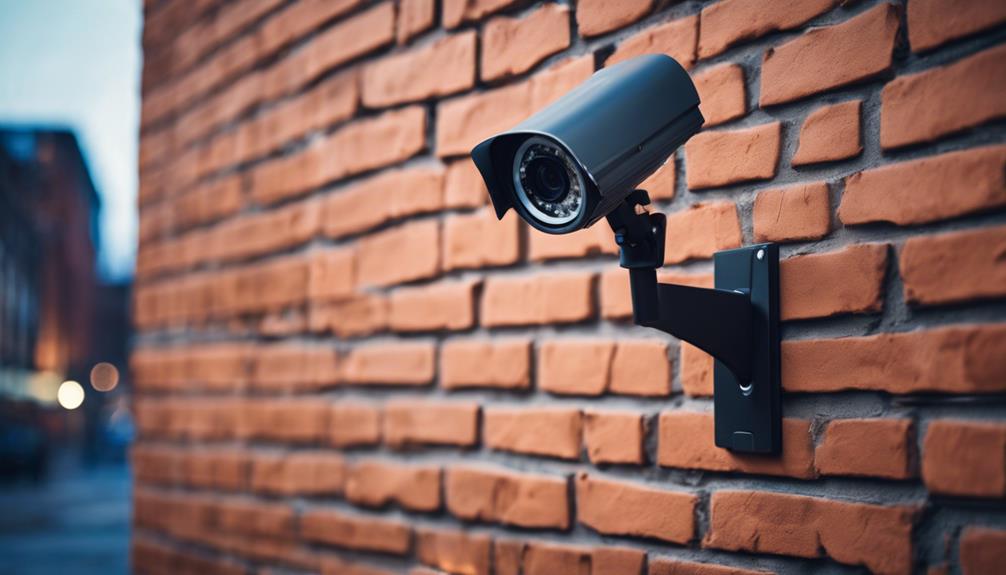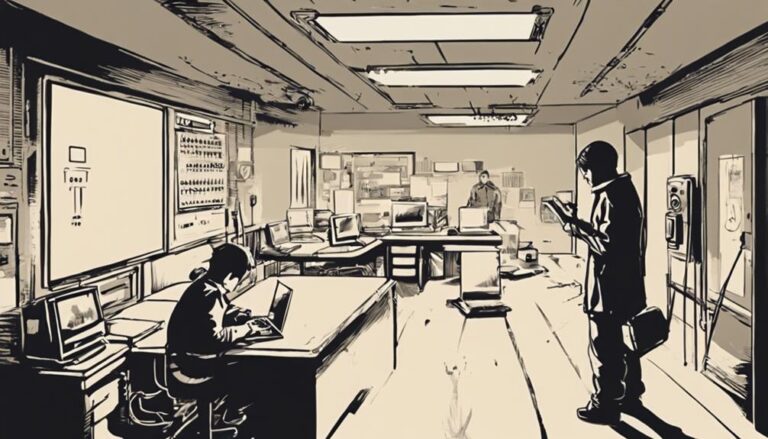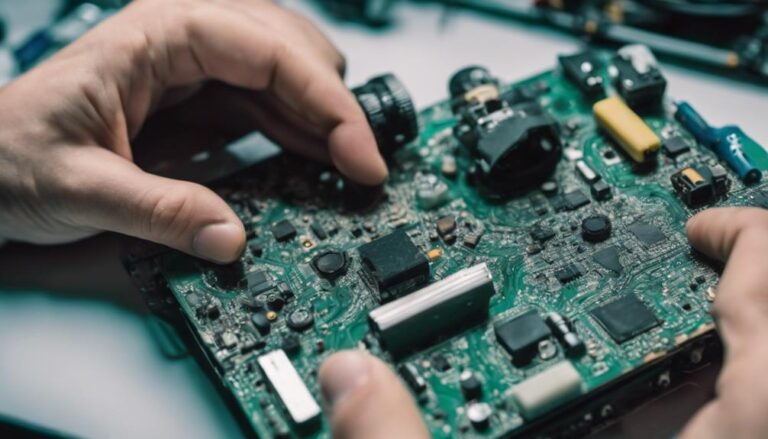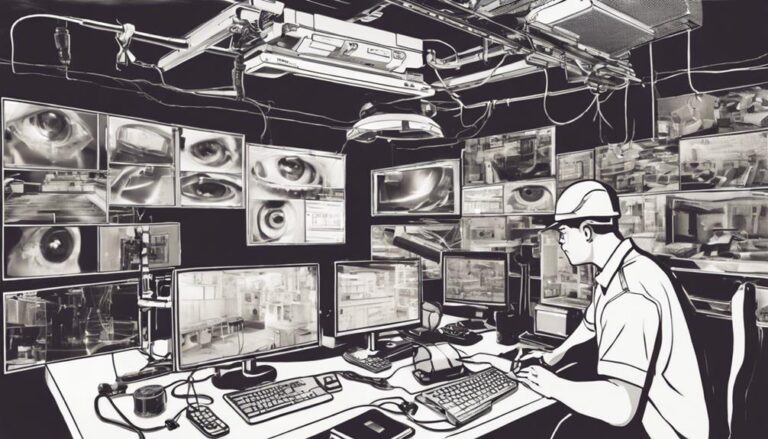A CCTV security recording system is essential for keeping your property safe. It continuously monitors activities, deterring potential threats and capturing important evidence during incidents. You can choose from various types of cameras, like dome, bullet, or even IP cameras, each offering unique benefits. Key features such as high resolution, night vision, and motion detection can enhance your setup. Plus, remote access lets you monitor your property anytime, giving you peace of mind. Understanding legal considerations and maintenance tips is important too. If you’re interested in optimizing your surveillance, there’s much more to explore about this technology.
Importance of CCTV Systems
Recognizing the significance of CCTV systems can greatly enhance your security measures. In a world where personal freedom is cherished, ensuring your safety shouldn’t come at the expense of your privacy. CCTV systems act as a vigilant guardian, providing peace of mind by deterring potential threats and capturing evidence should an incident occur.
By installing cameras in strategic locations, you’re not just protecting your property; you’re also safeguarding your autonomy. A well-placed CCTV setup can help you monitor activities around your home or business, allowing you to maintain control over your environment. This is especially crucial in today’s landscape, where unwanted intrusions can compromise your sense of freedom.
Moreover, the mere presence of cameras can deter criminal behavior, making it a less attractive target for those with ill intentions. With many modern systems offering remote access, you can monitor your surroundings anytime, anywhere, empowering you to take action if necessary. Ultimately, embracing CCTV technology means taking a proactive stance in preserving your security and freedom, reinforcing the idea that safety and autonomy can coexist harmoniously. Your peace of mind is worth the investment in a robust CCTV system.
Types of CCTV Cameras
When choosing the right CCTV camera for your security needs, understanding the various types available can make all the difference. You’ve got several options to evaluate, each with unique advantages that cater to different situations.
First up, there are dome cameras. These are discreet and blend in well with their surroundings, making them perfect for indoor spaces where you want to maintain a low profile. Next, bullet cameras are more conspicuous and ideal for outdoor use, providing a clear view and often featuring weather-resistant housing.
If you’re aiming for wide coverage, PTZ (pan-tilt-zoom) cameras might be your best bet. They can be remotely controlled to pan across large areas, allowing for dynamic monitoring. For those seeking advanced technology, IP cameras offer high-resolution images and can connect to your network, enabling remote access from anywhere.
Lastly, evaluate thermal cameras if you need to monitor in complete darkness. They detect heat rather than light, making them effective in low-light conditions. By understanding these types, you can choose the CCTV camera that best suits your need for security and freedom.
Key Features to Consider
After selecting the right type of CCTV camera, the next step is to think about the key features that will enhance your security setup. You’ll want to evaluate resolution first. Higher resolution cameras provide clearer images, which are essential for identifying faces or license plates. Look for at least 1080p, but if you can, aim for 4K for exceptional clarity.
Next, consider night vision capabilities. Cameras with infrared technology can capture clear footage in low-light conditions, ensuring you’re covered even after dark. Don’t overlook the significance of motion detection; this feature allows you to receive alerts only when activity is detected, saving you time and storage space.
Examine the storage options, too. Some systems offer cloud storage, while others use local hard drives. Weigh the pros and cons based on your needs and budget. Finally, ease of remote access is imperative. You should be able to view your camera feeds from anywhere using a smartphone or computer, giving you peace of mind wherever you are.
Installation Process Overview
Installing a CCTV security recording system may seem intimidating, but breaking it down into manageable steps can simplify the process. First, you’ll want to choose the right camera locations. Think about high-traffic areas and potential entry points to guarantee maximum coverage.
Next, gather your tools and equipment. Most systems come with installation manuals, so follow those closely. You’ll typically need a drill, screws, and possibly some cable management solutions.
After that, mount the cameras at the chosen locations. Make sure they’re secure and positioned to capture the best angles. Once the cameras are in place, connect them to your recording device or network. This often involves running cables or setting up wireless connections, so take your time to avoid any issues.
Benefits of Remote Access
With remote access, you get enhanced surveillance flexibility, allowing you to monitor your property from anywhere. This real-time access means you can respond to security threats instantly, increasing your overall safety. You’ll appreciate the peace of mind that comes with being able to check in whenever you need.
Enhanced Surveillance Flexibility
In today’s fast-paced world, having the ability to monitor your property from anywhere can make all the difference. With enhanced surveillance flexibility, you can check on your home or business from your smartphone, tablet, or laptop, no matter where you are. This freedom allows you to stay connected to your property, whether you’re at work, on vacation, or simply running errands.
Imagine the peace of mind you’ll feel knowing you can keep an eye on things without being physically present. You can quickly respond to any suspicious activity, ensuring your property remains secure. Plus, you can easily share access with trusted friends or family members, so they can help keep an eye on things too.
Enhanced surveillance flexibility also means you can review recorded footage whenever you need. If something happens, you won’t have to wait until you get home to find out what occurred. You’ll have the ability to act swiftly, ensuring your safety and that of your belongings. By embracing this technology, you’re taking control of your security and enjoying the freedom that comes with knowing you’re always connected to your space.
Real-Time Monitoring Access
Accessing your security system in real-time offers a significant advantage when it comes to protecting your property. With remote access, you can monitor your home or business from anywhere, using your smartphone, tablet, or computer. This means you’re not tied down to one location, and you can keep an eye on things while you’re away, whether you’re at work, on vacation, or simply running errands.
Having the freedom to check in whenever you want gives you peace of mind. You’ll instantly know if something’s amiss, and you can take action if necessary. Real-time monitoring also allows you to view live feeds, ensuring that you’re always aware of what’s happening.
Additionally, you can receive instant alerts and notifications if your system detects unusual activity. This means you’re not just relying on recorded footage; you’re actively engaged in the security of your property.
Increased Security Response
Remote access to your security system not only enhances your ability to monitor but also greatly improves your response to potential threats. You’re no longer tied to a physical location; you can check in from anywhere, whether you’re at work, on vacation, or running errands. This freedom means you can act quickly if something seems amiss.
Imagine receiving an alert about suspicious activity while you’re out. With remote access, you can view live footage right from your smartphone. If you spot a potential threat, you can contact local authorities immediately, providing them with real-time information. This swift action can make all the difference in preventing a crime or minimizing damage.
Moreover, knowing you can access your security system anytime enhances your peace of mind. You’re empowered to take control of your environment, ensuring your safety and that of your loved ones. You can monitor your property whenever you want, making you feel secure and confident in your home.
In essence, remote access translates to a more proactive approach to security, allowing you to respond effectively and promptly in any situation. Embrace this technology and reclaim your sense of freedom!
Legal Considerations for Surveillance
When setting up your CCTV system, you’ve got to contemplate the legal implications of surveillance. This includes understanding privacy rights and regulations, as well as your obligations regarding data storage and consent. Ignoring these factors can lead to serious legal issues, so it’s crucial to stay informed.
Privacy Rights and Regulations
In the domain of CCTV security systems, understanding privacy rights and regulations is vital. You’ve got to recognize that while surveillance can enhance safety, it also raises significant concerns about individual privacy. Laws vary widely depending on where you live, but most places require you to notify individuals that they’re being recorded, especially in public spaces.
It’s important to know that recording in areas where people expect privacy, like restrooms or changing rooms, is typically illegal. So, if you’re considering installing CCTV, think carefully about placement and make certain you’re compliant with local regulations. Ignoring these laws can lead to hefty fines and legal repercussions.
Moreover, transparency is key. You should clearly communicate the purpose of your surveillance systems to those being monitored. This not only builds trust but also aligns with the spirit of freedom that many value. Always stay informed about evolving laws, as privacy regulations are increasingly becoming a hot topic. By respecting individuals’ rights, you not only protect yourself legally but also contribute to a culture where freedom and security can coexist harmoniously.
Data Storage Requirements
While you might be keen to set up your CCTV system, understanding data storage requirements is fundamental for legal compliance. Every jurisdiction has laws dictating how long you can store footage and under what conditions. You don’t want to face hefty fines or legal hassles due to improper data management.
Typically, you should keep recorded data for a limited time, often ranging from 30 to 90 days. After this period, it’s generally required that you either delete the footage or securely store it if there’s an ongoing investigation or legitimate need. It’s essential to have a clear policy on data retention that aligns with local regulations.
Beyond duration, the security of your stored data is critical. Use encrypted storage solutions to protect sensitive footage from unauthorized access. Not only will this safeguard personal privacy, but it’ll also help you stay compliant with data protection laws.
Consent and Notification Obligations
Understanding consent and notification obligations is vital for any CCTV installation, as failing to comply with legal requirements can lead to significant repercussions. You need to be aware that recording individuals without their knowledge or consent can breach privacy laws, resulting in hefty fines or legal action.
Before setting up cameras, it’s important to notify people that surveillance is taking place. This can be achieved through clear signage indicating that CCTV is in use. Transparency fosters trust and demonstrates respect for individual privacy. Additionally, obtaining consent from individuals—especially in private settings—can protect you from potential legal issues.
It’s also important to familiarize yourself with local laws regarding surveillance. Different regions have varying rules about recording in public versus private spaces. Understanding these regulations guarantees you’re not inadvertently infringing on someone’s rights.
Maintenance and Upkeep Tips
Keeping your CCTV security recording system in top shape is essential for ensuring reliable surveillance. First, regularly check the camera lenses for dirt, dust, or obstructions. A clean lens means clearer images, which can be significant in identifying potential threats.
Next, inspect the wiring and connections. Loose or damaged cables can lead to disruptions in your recordings. Make it a habit to check these components at least once a month.
You should also update your software and firmware regularly. Manufacturers often release updates that enhance security and improve functionality. Ignoring these updates could leave your system vulnerable.
Another important tip is to check your storage capacity. If your hard drive is full, you might miss recording important events. Set a schedule to review and back up footage, deleting what you no longer need.
Future Trends in CCTV Technology
As you focus on maintaining your CCTV security recording system, it’s also important to look ahead at the future of CCTV technology. Innovations are on the horizon that could enhance your security while respecting your need for freedom and privacy. One major trend is the integration of artificial intelligence (AI) in surveillance systems. This technology enables smarter detection of unusual activity, reducing false alarms and giving you peace of mind.
Another exciting development is the shift towards cloud-based storage. With this, you won’t have to worry about losing footage due to local hardware failures. You’ll have access to your recordings from anywhere, and it offers scalability as your security needs grow.
Moreover, you can expect advancements in camera design, such as smaller, more discreet models that blend seamlessly into your environment, ensuring that surveillance doesn’t intrude on your personal space.
Frequently Asked Questions
How Long Can CCTV Footage Be Stored?
When it comes to footage storage, it really depends on the system and settings you choose. Typically, you can store it for anywhere from a few days to several weeks, depending on your needs and resources.
Can CCTV Cameras Function in Low Light?
In the shadows, where light whispers secrets, you’ll find cameras that see beyond twilight. They’ve got night vision tech, so you won’t miss a thing. Embrace the unseen; freedom lies in clarity, even in darkness.
What Is the Average Cost of a CCTV System?
The average cost of a security system can vary greatly, typically ranging from a few hundred to several thousand dollars. It depends on features, quality, and installation. You should consider your specific needs and budget.
Can I Integrate CCTV With My Smart Home System?
Did you know that over 50% of smart home users integrate security features? You can definitely integrate your CCTV with your smart home system, giving you enhanced control and peace of mind for your privacy and safety.
What Happens if the CCTV System Fails?
If your system fails, you might lose important footage and security. It’s crucial to have backups or a secondary system in place to guarantee you maintain control over your safety and peace of mind.



